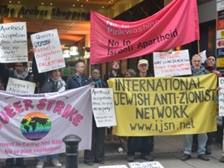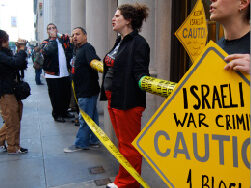

The UK chapter of IJAN was launched in 2008. From the beginning we have prioritised our accountability to the Palestinian struggle, worked with others in the Palestinian solidarity movement and other grassroots movements impacted by Israeli apartheid, murder, repression, militarization and other brutality.
In solidarity with 60-plus years of Palestinian resistance to the founding of Israel
The Conference, held at the School of Oriental andAfrican Studies (SOAS) in London, was hosted by the SOAS Palestinian Societyand drew close to 200 academics and activists from around the world. While allthe presentations were useful, talks by Adam Hanieh and Jamal Juma stand out.Hanieh laid out how some sectors of Palestinian society had in fact actuallybenefited from Oslo (getting jobs and money) and therefore had a vestedinterest in continuing the partnership with Zionism at the expense of theoverwhelming majority of Palestinians. Two presentations by Stop the Wall'sJamal Juma, a grassroots activist from the West Bank, offered a detaileddescription of resistance on the ground both in the lead up to the Oslo Accordsand continued resistance to fight against the monster that the Oslo Accordshave created.
IJAN's contributionincluded laying out in detail why we organize as Jews against Zionism, and adescription of our strategy of Joint Struggle against Zionism as part ofbroader movements for justice and using the grass-roots Palestinian resistanceas our point of reference. Otherspeakers explained how in the aftermath of Oslo utilities in the West Bank havebeen integrated into Israeli and settlement distribution systems making itpossible to cut off electricity and water to Palestinians while leaving thesettlements untouched. You can see a video of much of the conference here.Integrating Critique and Moving Forward from Stuart Platt on Vimeo.
On Saturday evening 2 November,protestors gathered outside as the Tricycle opened an Israeli-sponsored Jewishfilm festival.
The livelyand colourful protest was called by the International Jewish Anti-ZionistNetwork, in response to the Israeli Embassy's sponsorship of the Tricycle'sFestival. People from different faiths, including an Israeli activist,Palestinian solidarity activists, and campaigners from the KentishTown-based Global Women's Strike, came together to remind the Tricycle that atthe very same time that they hosted the festival last year, Israel was bombingGaza, killing 158 Palestinians; including 30 children.
Protestors, who have valued theTricycle for decades through its vitally informative and entertaining playsabout Afghanistan, Ireland's Bloody Sunday, US Guantanamo, the Stephen LawrenceInquiry, and more, are appalled at the Tricycle hosting a film festivalsponsored by a government whose major industry is repression, not only ofPalestinians but around the world.
With placards and a loudspeaker theyhighlighted that Israel had broken the international boycott of apartheid South Africa - supplying itwith military hardware and training, and helping build its nuclear industry;had armed the Argentinean junta even as it killed thousands, including manyJews; had helped arm and train the Rwandan military and Hutu militia whichcommitted genocide against the Tutsis; and helped arm the Sri Lankan governmentwith warfare technology, including drones, enabling it to massacre tensof thousands of Tamils.*
Protestors were shocked that theTricycle was not only using security guards who refused to identify themselves,but also that a vanload of police had been called on an entirely peacefulprotest. The protestors, who are mainly local residents and theTricycle's most loyal audience, have written to the new artistic director ofthe Tricycle, Indhu Rubasingham, to say: "Given that Israeli apartheid is not loved, especially inmulti-racial Kilburn . . . Is this who the Tricycle wants to be associatedwith?
{image_1}
{image_1}
On 20 November 2012, under the shadow of the Israeli bombing of Gaza, a Jewish anti-Zionist panel spoke about Confronting Zionism at the London School of Economics (LSE) - organised by LSE Student Union Palestine Society.
Yael Kahn & Michael Kalmanovitz (both IJAN) spoke about their rejection of, and campaigning against, Zionism; also speaking was John Rose from the British Committee for Universities for Palestine (BRICUP). Thepredominatly student audience was transfixed when Yael spoke about her discovery that her family home was on stolen land. The meeting was chaired by Emeritus Professor Jonathan Rosenhead (BRICUP).

CONTACT
FOLLOW US
SUBSCRIBE TO OUR NEWSLETTER
BUSINESS OF BACKLASH
Click here to download the 120-report which exposes the funders of Zionist backlash on campuses and in communities
SEARCH THE SITE
NAVIGATION
WHO WE ARE
NEWS & OPINIONS
PROJECTS & CAMPAIGNS
CHAPTERS & SECTORS
RESOURCES
GET INVOLVED

